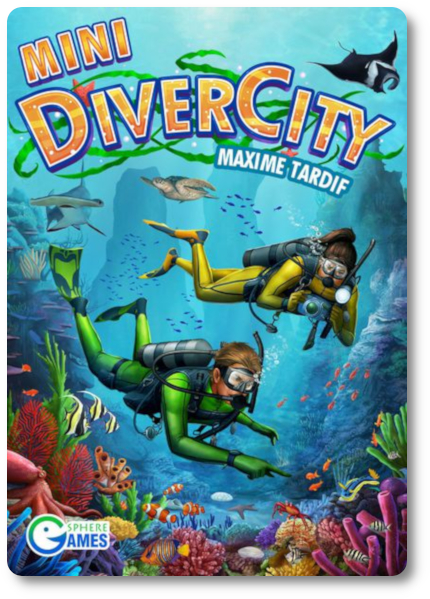
The Basics:
- For ages 8 and up
- For 1 to 7 players
- Approximately 20 minutes to complete
Geek Skills:
- Active Listening & Communication
- Counting & Math
- Logical & Critical Decision Making
- Reading
- Memorization & Pattern/Color Matching
- Strategy & Tactics
- Risk vs. Reward
- Cooperative & Team Play
- Hand/Resource Management
Learning Curve:
- Child – Easy
- Adult – Easy
Theme & Narrative:
- Save the ocean; save humanity
Endorsement:
- Gamer Geek approved!
- Parent Geek approved!
- Child Geek approved!
Overview
American linguist, philosopher, cognitive scientist, historian, political activist, and social critic, Avram Noam Chomsky, said “There are two problems for our species’ survival – nuclear war and environmental catastrophe – and we’re hurtling towards them. Knowingly.” Our species – Humans – are capable of tremendous damage, but we also have the capacity to create. And more importantly, to protect. In this game, you are racing against time to save animals from the destructive greed of mankind.
Mini DiverCity, designed by Maxime Tardif and published by Sphere Games, is comprised of 107 cards (representing corporations, divers, species scales, species, and hotels) and 12 Species tokens. The cards are as thick and as durable as your standard playing card. The tokens are made of thick and solid cardboard. Illustrations, by Gong Studios, are bright and highly detailed. Excellent quality for a little game.
Game Set Up
To set up the game, first look through the deck and remove the Species and Corporation cards. Shuffle these two types of cards into two separate decks. Place these face-down in the middle of the playing area to create the Species and Corporate draw decks. Deal to each player five Species cards, face-down. Players should not look at their cards at this time. I cannot overstate this. DO NOT LOOK AT YOUR CARDS!
Second, deal to each player one Diver card at random or allow each player to select the Diver card they want to use during the game. Diver cards, once given to the player, should be placed face-up in front of their owning player. Each Diver has a unique ability, but no one Diver has an advantage over of the other. Place any unused Diver cards back in the game box.
Third, look for and remove the Species Scale cards. Place these in the middle of the playing area in a column with the green side to the right (green represents “survival”) and the red side to the left (red represents “extinction”). Take the Species tokens and place each token on its matching species image on the cards.
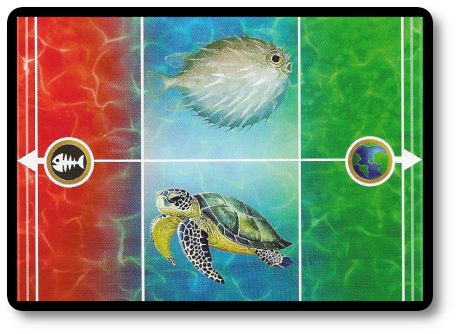
Fourth, place the Hotel cards and place three on one side of the Species Scale card column and three are on the other side, island side facing up (the other side shows the same island, but with a hotel built upon it).
That’s it for game set up. Determine who will be the first player and begin.
Playing the Game
Mini DiverCity is a cooperative game, wherein players must work together to win as a group or lose as a group. But this game comes with a twist. First off, players never know what cards they are holding. They are dependent on their peers to assist in playing the cards they have. Second, and perhaps most important, players cannot talk to each other about what cards their fellow players are holding or discuss strategy. This is meant to mimic the thematic element of each player taking control of a Diver who is at different locations in the ocean.
The game is played in rounds and turns, with no set number of rounds per game. A game turn is comprised first of the evil Corporations taking their turn followed by all the players (the Divers). A game round is summarized here.
Note: The discard pile for Species is never used to refill the Species draw deck, but it can be used to randomly select a Species card if the Species draw deck is unavailable. Thematically, this suggests (and rightly so) that there are only so many living animals of a specific species. Once they are gone, they are gone. The same cannot be said for corporations. If the Corporation draw deck is ever exhausted, shuffle the Corporation discard pile to refresh the Corporation draw deck.
Step One: The Evil Corporations Have Their Way
The active player draws the top-most Corporation card from the Corporation draw deck, revealing it to all the players. The Corporation card is immediately resolved. There are one or more possible impacts, depending on the card drawn. They are as follows:
If an Oil Platform is Drawn
The active player selects one Species card in their hand (without looking at its face) and discards it. The Species token matching the discarded Species card is moved towards extinction (towards or into the red portion of the Species Scale card or it becomes extinct if it’s already in the red). If the Species is saved, no action is taken. The active player then draws a new Species card, adding it to their hand, being careful not to view the card’s face.
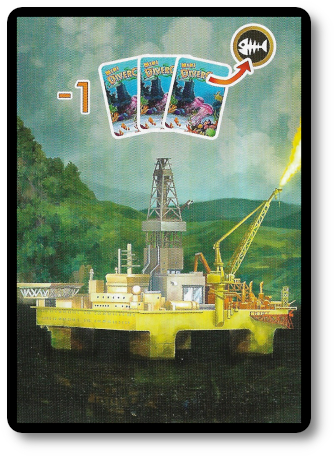
If a Dynamite Fisher is Drawn
The active player draws the top-most Species card from the Species deck and discards it. The Species token matching the discarded Species card is moved towards extinction (towards or into the red portion of the Species Scale card or it becomes extinct if it’s already in the red). If the Species is saved, no action is taken.
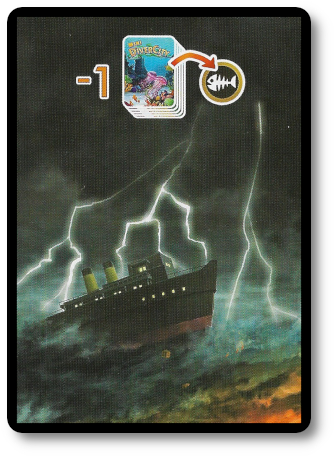
If a Hotel is Drawn
Flip the matching colored Hotel cards currently on their island side to reveal the hotels on the island. If the Hotel is already showing, no action is taken.

If the Corporate card drawn has two impacts, the top-most is resolved first. Then resolve the second.
Step Two: The Divers (Try) to Save the Day
In any turn order sequence the player’s like, each player now takes one of three possible actions. These actions are as follows:
Play a Species Card
This action allows the player to play one Species card from their hand (without looking at its face) and discard it. The Species token matching the discarded Species card is moved towards the green (getting saved) on the Species Scale card. If the Species is saved or extinct, no action is taken. The player then draws a new Species card, adding it to their hand, being careful not to view the card’s face.
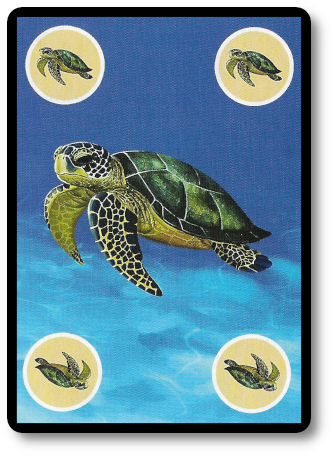
Use Your Walkie-Talkie
This action allows the player to tell one other player all the Species cards they have in their hand, pointing to each card and announcing the species it represents.
Close Down a Hotel
This action allows the player to discard any Species card from their hand, followed by flipping over any Hotel card currently showing a hotel on the card facing. The player then draws a new Species card, adding it to their hand, being careful not to view the card’s face.
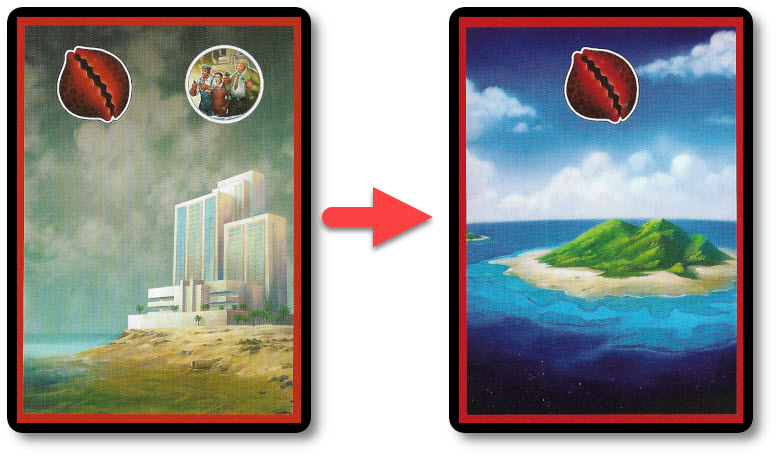
Deep Diving Diver Powers
Each Diver card has a special ability. These can be used once per game by the player who owns the Diver card. Further more, they can only be activated by the player if they are the active player for the round, triggering the Diver power either before or after they take their selected action. Note that using the Diver ability does not count as the player’s action and using the Diver ability is always optional.
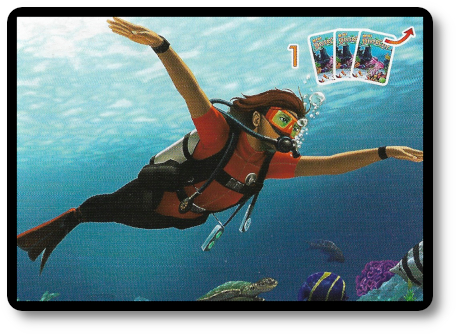
Diver special abilities are as follows:
- Move a Species token
- Instruct a fellow Diver to play a Species card from their hand
- Flip a Hotel card over to the island side
- Look at cards in the Corporation draw deck
- Look at your own hand of Species cards
- Play a Species card from your own hand
- Tell another player all the species they are holding
Once the active player uses their Diver special ability, they flip their Diver card over, visually indicating that the special ability is no longer available.
Announcing Assumptions
As stated, players are not free to talk to each about strategy by default. They can use actions and Diver special abilities to help communicate and empower their fellow team members. This means players are not totally in the dark, but they must make choices in the game that specifically allow them to communicate with each other. A player can, without taking an action, announce to the table what Species cards they think they are holding. The other players cannot respond in any way, indicating that the player announcing their assumed Species cards is right or not. However, by announcing to the table what cards the player assumes they have, it informs the other players what they are thinking. Better actions and choices can then be made by the player’s team members to either reinforce the assumption or correct it.
Ending the Round
The round ends when all the players have taken their turn, completing one of the three possible actions. A new round now beings. The player left of the current active player in the previous round becomes the active player in the new round. This player can use their Diver special ability during the new round if they have not done so already.
Ending the Game
The game continues as noted above, with players completing rounds of game play, until one of four conditions are met.
- If the players have saved a specific number of species, they win!
- If the Corporation kills (goes extinct) a specific number of species, the players lose!
- If the Corporation builds all the hotels, the player’s lose!
- If any player is ever unable to draw a card from the Species draw deck (because all have been drawn or discarded), the player’s lose!
Game Variant
There are several different ways to play the game. The basic game play is summarized above. The different game variants are summarized here.
- Easier Game: This game variant reduces the impact of the evil Corporations, allows players to communicate easier, and reduces the required conditions to win the game. Recommended for new players or very young players. Still a challenging game, but the difficulty is significantly less than what it would be normally.
- Full Dive Crew: Instead of giving one Diver card to each player, use them all. Some players will have two Diver cards and some players will have one.
- Evil Corporate Overlord: The Corporations are now controlled by a player known simply as the “Industrialist”. This game variant puts a person in the seat of the Corporations, allowing that player to play Corporation cards from their own hand.
- Diving Solo: This variant let’s the player try to save the oceans as a one man team, but doing so only allows them to manage the survival of one species at a time.
- Real Divers: This is a fun game variant that removes ALL TALKING from the game. Thematically speaking, the players are pretending they are underwater. The only way to communicate is with hand signals.
To learn more about Mini DiverCity, visit the game’s web page.
Final Word
 The Child Geeks enjoyed the game, but at first found the reversed cards to be more of a distraction than an entertaining game mechanism. According to one Child Geek, “I like the game and I like trying to save animals, but I don’t know why I can’t see the cards I want to play.” But as the games continued and the Child Geeks became more experienced, their tone and opinion changed. According to the same Child Geek, “I really like this game! Making your cards invisible and having to work together as a team makes you feel like you are working together like an elite diving force!” Not sure if that is what the game designer was going for, but that’s what the Child Geeks came to believe. After all the dives were done and every last sea turtle saved, the Child Geeks voted and agreed to endorse Mini DiverCity.
The Child Geeks enjoyed the game, but at first found the reversed cards to be more of a distraction than an entertaining game mechanism. According to one Child Geek, “I like the game and I like trying to save animals, but I don’t know why I can’t see the cards I want to play.” But as the games continued and the Child Geeks became more experienced, their tone and opinion changed. According to the same Child Geek, “I really like this game! Making your cards invisible and having to work together as a team makes you feel like you are working together like an elite diving force!” Not sure if that is what the game designer was going for, but that’s what the Child Geeks came to believe. After all the dives were done and every last sea turtle saved, the Child Geeks voted and agreed to endorse Mini DiverCity.
 The Parent Geeks found the game to more entertaining with their peers than with their children, stating that the required high-level of communication and teamwork is essential to the game play. According to one Parent Geek, “This is a game that will frustrate you a great deal if you are not playing with others who understand the subtle nature of the game.” Which is to say, when the adults played with the kids, the importance of “working the system” in the game (that is, maneuvering around the communication obstacles) is essential to winning the game. The Child Geeks didn’t always get that and the results were a game lost. Which is not to say that the Parent Geeks didn’t enjoy playing the game with their kids. As one Parent Geek put it, “You are not meant to win every game you play and a game that you lose because you do not work together as a team only strengthens the value of teamwork.” Well said! When the last diver was out of the water, the Parent Geeks voted and approved Mini DiverCity.
The Parent Geeks found the game to more entertaining with their peers than with their children, stating that the required high-level of communication and teamwork is essential to the game play. According to one Parent Geek, “This is a game that will frustrate you a great deal if you are not playing with others who understand the subtle nature of the game.” Which is to say, when the adults played with the kids, the importance of “working the system” in the game (that is, maneuvering around the communication obstacles) is essential to winning the game. The Child Geeks didn’t always get that and the results were a game lost. Which is not to say that the Parent Geeks didn’t enjoy playing the game with their kids. As one Parent Geek put it, “You are not meant to win every game you play and a game that you lose because you do not work together as a team only strengthens the value of teamwork.” Well said! When the last diver was out of the water, the Parent Geeks voted and approved Mini DiverCity.
 The Gamer Geeks liked what the game was about and how it went about it. According to one Gamer Geek, “A small game, not a mini or a macro, but a full on game that required more of my attention than I thought. I enjoyed it and would play it again.” Another Gamer Geek said, “With a group of friends you’ve know for a long time, you’d think that this game would be a breeze. But it isn’t. You might know the players well, but the way the game hides information in the open and limits communication makes it a real challenge. If only I could read minds.” The Gamer Geeks were impressed with the level of game play depth that made each session a challenge and a joy without being overbearing or terribly limiting. As one Gamer Geek put it best, “The game hamstrings you just enough to ensure you cannot sprint, but you can certainly still move.” All the Gamer Geeks voted to approve Mini DiverCity.
The Gamer Geeks liked what the game was about and how it went about it. According to one Gamer Geek, “A small game, not a mini or a macro, but a full on game that required more of my attention than I thought. I enjoyed it and would play it again.” Another Gamer Geek said, “With a group of friends you’ve know for a long time, you’d think that this game would be a breeze. But it isn’t. You might know the players well, but the way the game hides information in the open and limits communication makes it a real challenge. If only I could read minds.” The Gamer Geeks were impressed with the level of game play depth that made each session a challenge and a joy without being overbearing or terribly limiting. As one Gamer Geek put it best, “The game hamstrings you just enough to ensure you cannot sprint, but you can certainly still move.” All the Gamer Geeks voted to approve Mini DiverCity.
 This is a very easy game to teach and real devil of a game to win. I loved it. Challenging and engaging, each round feels intense and you can’t help but feel you are at a disadvantage right from the start. I love how this game makes the players feel like they really are going against big corporations with lots of resources. You feel small in comparison; weak. But you are also nimble. Players must learn how to be creative and milk every opportunity for what it’s worth.
This is a very easy game to teach and real devil of a game to win. I loved it. Challenging and engaging, each round feels intense and you can’t help but feel you are at a disadvantage right from the start. I love how this game makes the players feel like they really are going against big corporations with lots of resources. You feel small in comparison; weak. But you are also nimble. Players must learn how to be creative and milk every opportunity for what it’s worth.
The most enjoyable aspect of the game was the teamwork. Mini DiverCity requires players to work together, not just for a common goal, but to help each other understand what must be done. Many cooperative games do not do this even half as well as Mini DiverCity. By limiting the information the player has regarding their own hand of cards and unlimited information about what their team members have, it creates an interesting dynamic that requires each player to be dependent on the other. Not in an unhealthy and limiting way, but in a strategic and tactical way.
How so?
Consider the following. Young and inexperienced players can be overwhelmed with too much information creating what I like to call mental “vapor lock”. Or, as many others refer to it, “paralysis analysis”. That is, you over think things resulting in not being able to make a decision. This is not possible in this game. In fact, you are so hungry for information you spend the majority of the time making choices not on all that you know, but all that you think you know. It’s this level of assumption, making choices based on cloudy facts, that many people (both at the gaming table and in real life) don’t care for. But in Mini DiverCity not knowing everything is a fact. Knowing just enough is the goal. To achieve that goal it requires a team.
Mini DiverCity is a game all about teamwork and communication. It not only implements that beautifully in the game play, but leverages it so well that players get into the groove quickly, resulting in success or spectacular failure. Do try Mini DiverCity when time permits at your gaming table. It’s easy to teach and will challenge your players. Each gaming session, no matter how good the players, was always an exercise in nail-biting and rubbing of the brow in anxious anticipation. Love it. Dive into your next game play with this little gem and you won’t be sorry.
This game was given to Father Geek as a review copy. Father Geek was not paid, bribed, wined, dined, or threatened in vain hopes of influencing this review. Such is the statuesque and legendary integrity of Father Geek.



